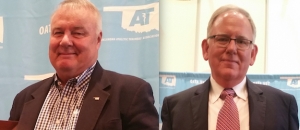
Herb Rhea was a trailblazer when he was hired as Enid High’s athletic trainer out of Oklahoma State University in the summer of 1978 by newly hired Harvey Griffin, whom he had worked with the Cowboys.
Rhea was one of the first trainers with a teaching degree hired exclusively as a trainer. His biggest legacy is being inducted into the Oklahoma Athletic Trainers Association Hall of Fame this weekend in Edmond.
“I’m grateful to be recognized as a Hall of Fame inductee,” Rhea said. “It means a lot to be recognized for the work we did trying to take care of kids and seeing them achieve their goals of what they were attempting to do.”
Rhea worked at Enid from 1978 to August 1988 when he took a year’s sabbatical to earn a masters degree at the University of Virginia. He came back to EHS for two years before leaving for Ferrum College in West Virginia for three years. He went to Jenks in August 1994 to be reunited with Ron Lancaster, whom he worked with the Plainsmen.
“Harvey Griffin saw the need — after coaching in college — for somebody to take on that role,” Rhea said. “I would like to think the coaches and myself were trailblazers in some of the things we tried to put together.”
Lancaster and Rhea were instrumental in Enid going from two-a-days to one practice in the preseason before school started in the mid to late 1980s.
Rhea had the players drink lots of Gatorade and Gatorload, another carboyhdrate drink. Parents would bring fruit to eat during the meetings.
“The great thing about that was they didn’t get muscle soreness they had from the two-a-day practices,” Rhea said. “They were more attentive. If you look now, a lot of people in the state are doing that in some form or another. Ron was ahead of his time.”
Rhea was long recognized by coaches for his ability to communicate with players. He often served as a go-between athlete and coach. Athletes weren’t afraid to confide in him.
“The coaches weren’t out there to lose — they’re trying to get the best out of every student athlete,” Rhea said. “Kids sometimes lose that perspective. I tried to tell them they’re trying to make you better. I tried to get the kids to buy into that. When you do, it’s a beautiful thing and you are a lot more successful.”
Rhea was credited with saving the Enid school district money with his maintenance of equipment. He said it was as much for safety that for financial reasons.
“We not only didn’t need to buy a bunch of equipment, but we were able to protect the kids in terms of safety,” he said.
He developed a staff of student trainers everywhere he went. Nine of his trainers at Jenks went into the profession.
“I just tried to teach the the kids to do things they can do so we can do the things they can’t do or weren’t qualified to do,” Rhea said.
Rhea tried to educate coaches on the care of concussions. He cringed when coaches would tell him “I had three of them in high school and it didn’t bother me.”
“How did you know it didn’t affect you,” Rhea said. “You might have been a 4.0 student instead of a 3.2 student. I think the perceptions that concussions are a big deal are changing for the better. I think people are realizing that just because you have a concussion doesn’t mean you’re a wimp.”
Rhea retired from Jenks last December and started his own company — Athletes Injury Management — in Stillwater.
“There are a lot of kids who don’t have insurance that need to be seen,” he said. “I don’t work at a school, I want to put myself out there so parents can see me.”
He has contacted schools in the Stillwater area, the Little League football organization there and is working with the CEO of a Stillwater hospital.
“I’m not ready to hit the easy chair,” he said. “I got a lot of information to give people out there.”
CLICK HERE FOR ORIGINAL ARTICLE

